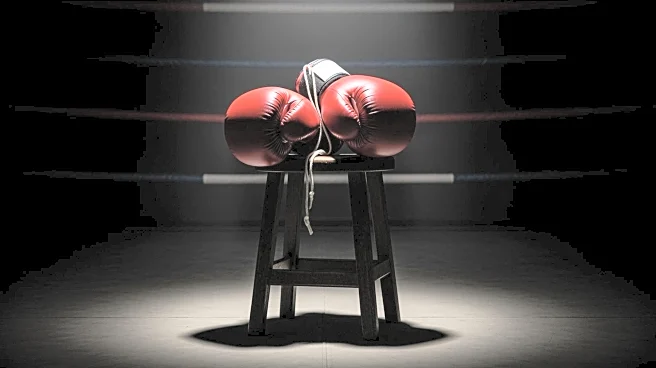What's Happening?
Ricky Hatton, a former two-weight world champion boxer, passed away in September 2025 at the age of 46. Known as 'The Hitman,' Hatton was a celebrated figure in British boxing, renowned for his victories and high-profile matches against legends like Floyd
Mayweather and Manny Pacquiao. Despite his success in the ring, Hatton faced significant personal challenges, including battles with mental health issues and substance abuse. His death was ruled a suicide, as revealed in an inquest hearing. Hatton's career spanned 15 years, during which he amassed a record of 45 wins and three losses. He was inducted into the International Boxing Hall of Fame in 2024, highlighting his contributions to the sport. Hatton also worked as a trainer, notably assisting Tyson Fury during his comeback. His personal life was marked by strained family relationships and a commitment to charitable causes, particularly mental health advocacy.
Why It's Important?
Ricky Hatton's story underscores the complex nature of fame and success in professional sports. While he achieved significant accolades and financial wealth, his struggles with mental health highlight the pressures athletes face. Hatton's openness about his challenges has contributed to broader discussions on mental health in sports, encouraging others to seek help and support. His tragic death serves as a reminder of the importance of mental health resources and support systems for athletes. Hatton's legacy in boxing remains influential, inspiring both fans and aspiring boxers. His charitable work, particularly with mental health organizations, continues to impact communities, emphasizing the need for ongoing support and awareness.
What's Next?
The full inquest into Ricky Hatton's death is scheduled for March 2026, which may provide further insights into the circumstances surrounding his passing. The boxing community and mental health advocates are likely to continue honoring Hatton's legacy through tributes and initiatives aimed at supporting athletes facing similar challenges. Discussions around mental health in sports are expected to gain momentum, potentially leading to increased resources and support for athletes. Hatton's influence as a trainer and mentor may inspire future generations of boxers, while his charitable efforts could lead to expanded programs and outreach in mental health advocacy.
Beyond the Headlines
Ricky Hatton's life and career reflect broader societal issues related to mental health, fame, and personal relationships. His experiences highlight the need for comprehensive support systems for individuals in high-pressure environments. The cultural impact of his openness about mental health struggles may encourage more athletes to share their experiences, fostering a more supportive and understanding environment. Hatton's story also raises ethical considerations regarding the responsibilities of sports organizations to provide mental health resources and support to their athletes. Long-term, his legacy may influence changes in how mental health is addressed within the sports industry.
















